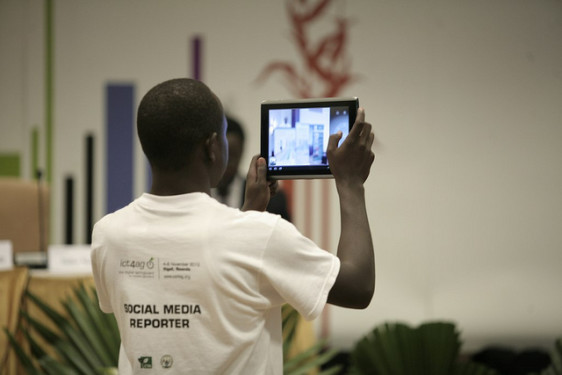Massive interest
There were more than 500 applications from different countries following a call for social reporters in August 2013. This demonstrated substantial interest on the part of the youth for social reporting and their willingness to learn more on ICT for agriculture.
‘When I applied to do social reporting at the ICT4ag conference, I didn’t really know what to expect or what kind of experience was awaiting me,’ said Catherine Banda from Malawi at the two-day training on social reporting in Kigali. Indeed, it was the first time that CTA had an official social reporting team at its annual international conference. And it was going to be a new experience for the whole team, including the social reporters and CTA.
CTA contracted a social reporting coordinator to lead the social reporting team. Ultimately, 15 reporters were selected to form the on-site team, and around 250 others formed part of a larger online team. CTA compiled a mailing list with 270 contacts that served as the main communication channel between the social reporting coordinator and the social reporters. The discussions immediately revealed how diverse the group was in terms of geography and also their involvement in agriculture and ICTs.
‘Since all of us on this list have interesting experiences with agriculture and ICTs,’ asked one of the social reporters, ‘why don’t we discuss the challenges in agriculture, provide examples of how ICTs are being used to address them and propose recommendations for the issues that still need to be addressed?’
These were the types of online discussions that took place in both English and French before the ICT4ag conference. They were moderated by two social reporters from the online team. It was a very fruitful activity as many ideas and experiences were shared from various countries and regions. The report of the e-discussion is currently being finalised and will be published soon on the conference social reporting blog.
Both the on-site team and the online team had specific reporting tasks at the conference. The on-site team attended a two-day training on social reporting in Kigali prior to the conference. They were exposed to the different tools that would be used during the conference, as well as who the target audience was and how to package and disseminate the content via different channels.
The social reporters also worked with the conference Knowledge Management (KM) team. ‘We don’t want to have a lot tweets or blog posts with content that doesn’t bring much value. Concentrate on the examples of innovations shared, the secret ingredient that made an initiative or innovation successful, lessons learnt and the actions taken to make it happen,’ Pete Cranston of the KM team told the social reporters during the training.
The pay-off
The coordination team for social reporting observed a stark improvement in quality of the work delivered by the social reporters before and after the on-site training in Kigali, both in the tweets they sent and in the writing on the blog posts. At least two reporters were assigned to each session during the conference. While they sent tweets, took photos and videos, and wrote blog posts, they also had the opportunity to interact with speakers and chairs from the sessions.
Meanwhile, while the on-site team was busy producing and publishing content, the online team was helping to disseminate the information through various channels (Facebook, Twitter, LinkedIn and YouTube). The social reporting coordinator continuously checked to ensure that everything was going as planned on-site and online.
The young social reporters really impressed at the conference. They were always the first ones to come to a session and the last ones to leave. The team worked around the clock, many of them sleeping just three or four hours a day to make sure they submitted their blog post and other content on time.
During the closing ceremony and gala dinner, the conference organisers gave the hard-working social reporters the recognition they deserved. They received their certificates in the presence of the Rwandan Minister of Youth and ICT, the Rwandan Minister of Agriculture and Animal Resources, the director of CTA and other distinguished delegates.
According to social media tracker Keyhole, from the month preceding the conference to its end, the event generated 12,322 posts, 1,910 unique users, 14,080,542 views and reached 2,536,835 people. For a first experience, these statistics are very encouraging and the contribution of each and every social reporter, whether online or on-site, was crucial to the success of the social reporting process.
While the figures showed the outreach of the social reporting team, for those who were involved in this activity it was a real learning and sharing experience. Everyone brought some form of knowledge and experience on social media, but all left with a wealth of skills that they will use in our activities, both personally and professionally. As on-site reporter Riten Gosai from Fiji said on the last day on the conference: ‘We came here as the social reporting team and are leaving as a family!’
Article originally published on CTA’s ICT Update Magazine
